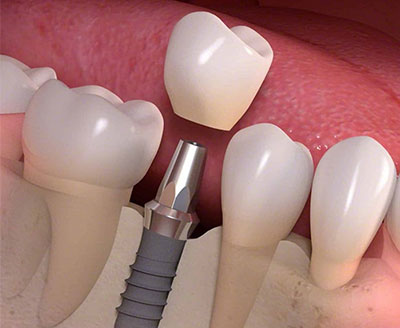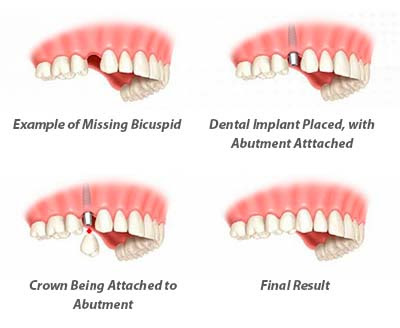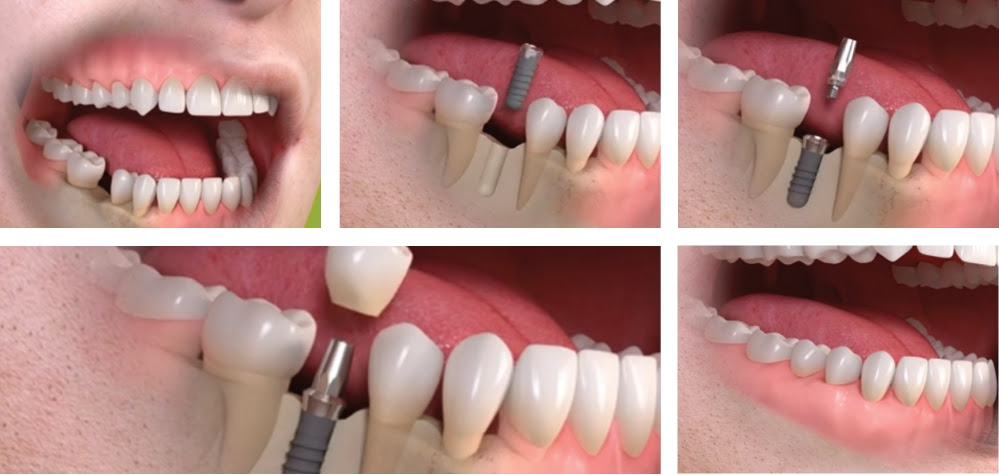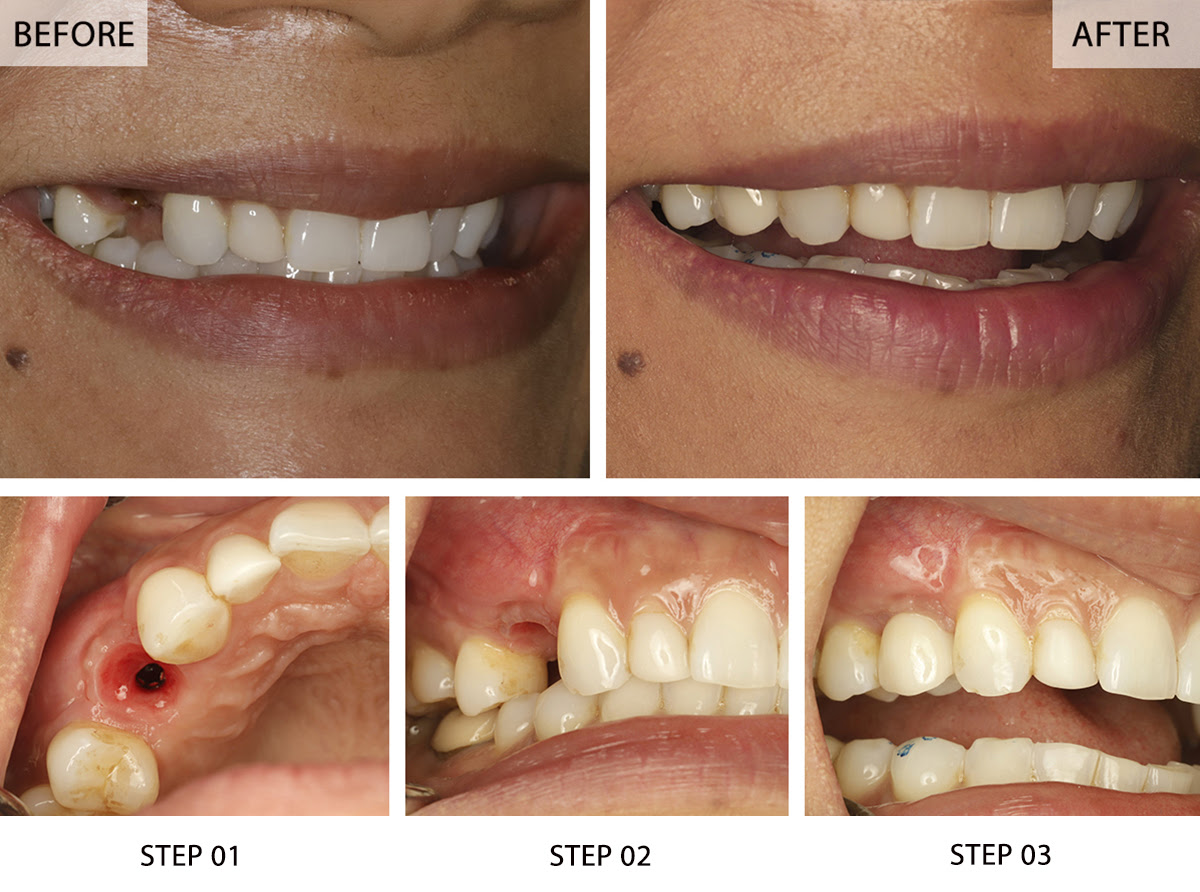| |

A single-tooth implant is widely regarded as the optimal solution for replacing a missing tooth. It offers a stable, long-lasting option that closely mimics the appearance and function of a natural tooth, all while preserving the integrity of adjacent teeth. Dr. Alex Kogan is highly trained in the placement of single dental implants and is one of the few implant dentists in San Francisco utilizing the latest and most advanced techniques and procedures in dental implantology. 
The treatment process is straightforward and designed to be easy for patients. To prepare for the implant procedure, Dr. Kogan conducts comprehensive diagnostic tests to ensure the best outcome. These tests enable him to plan and place your dental implant with advanced computer-guided technology, enhancing precision and reducing the overall length of the procedure. This method significantly increases the likelihood of long-term success, resulting in an implant that looks and feels like a natural tooth while providing excellent functionality.
|
Who Can Have a Single Tooth Implant?
Tooth replacement is an excellent option for patients who have lost a tooth due to disease, trauma, or have a congenitally missing tooth. Implant treatment is suitable for individuals whose teeth and jaws have fully developed.
The primary requirement is to maintain good dental and overall health. Research shows that age and gender do not significantly impact the success of dental implant treatment. During your initial consultation, Dr. Kogan will assess your dental and medical history and conduct a thorough examination to determine if a single tooth implant is the best treatment option for you.

A single tooth implant process entails:
Planning: We begin with an initial consultation where Dr. Kogan reviews your medical history, examines your mouth, and takes X-rays. 3D scan (CBCT) is ordered to assess bone structure and suitability for the implant. Based on this assessment, a personalized treatment plan is created, which may include additional procedures such as bone grafting if there’s inadequate bone density or a sinus lift if the sinus is too close to the implant site. Using advanced computer-aided technology, a precise surgical guide is then designed and fabricated to ensure accurate implant placement during the procedure.
Treatment: The actual surgery can be carried out under local anesthetic and requires a small incision to be made in your gums, exposing the underlying bone. After, an implant is carefully inserted into its preplanned location.
Healing cap: Dr. Kogan will place a healing cap over the dental implant before stitching up the gum. The healing cap protects the implant, allowing it to heal and integrate with the surrounding bone, and it helps shape the gum tissue.
Temporary tooth: If the implant is in the visible area of the mouth, we can provide you with a temporary tooth solution to be worn while the implant heals, so there is no need to worry that you will be left with a gappy smile during treatment.
Permanent Crown: Once the implant has fully healed and Dr. Kogan confirms it is strong and stable, he will create and fit your custom crown, restoring both function and appearance. |
Recovery
A single dental implant can usually be placed in about an hour, and the recovery time is relatively quick. Most people feel well enough to return to work or normal activities the following day. It's not uncommon to experience little to no discomfort after this surgery. If any discomfort does occur, it can typically be managed effectively with over-the-counter pain relievers. |

Advantages of a Single Tooth Implant
Preserves Neighboring Teeth: Unlike bridges, dental implants do not require adjacent teeth to be altered or shaved down.
Prevents Bone Resorption: Implants maintain jawbone density, preventing bone deterioration in the area.
Aesthetic Appeal: A single implant allows the new tooth to appear as though it is naturally emerging from the gums, like a natural tooth.
Cost-Effective in the Long Run: Although the initial investment may be higher, implants eliminate the recurring costs of replacing bridges or partial dentures.
Easy Maintenance: Single dental implants can be brushed and flossed just like natural teeth, simplifying oral care.
Highly Successful Dental Procedure: Dental implants have an exceptional success rate, making them one of the most reliable solutions for replacing missing teeth.
Long-Lasting: Single implants are engineered for durability, often lasting many years or even a lifetime with proper care.
Boosts Self-Confidence: Restoring your smile with a cutting-edge treatment like dental implant can greatly enhance your self-esteem, empowering you to move forward with renewed confidence after experiencing tooth loss.
| Drawbacks of a Single Tooth Implant
Length of Treatment: The process typically takes several months to complete, including healing time after surgery.
Surgical Procedure: As with any surgery, there are inherent risks, including infection and complications related to anesthesia.
Cost: Initial costs for dental implants can be higher than other options, such as bridges.
Aesthetic Considerations: In some cases, the gum tissue may not heal perfectly around the implant, affecting the overall appearance.
| Success Rate
Single dental implant procedure boasts an impressive success rate of approximately 95%. Many patients enjoy the benefits of their implants for years, or even a lifetime. One key reason for this high success rate is that single dental implants are easy to maintain; they can be brushed and flossed just like natural teeth, reducing the risk of infection.
|
Risk Factors for Single Tooth Implants
While well-planned single dental implant surgery is generally very safe, there are some risk factors to consider:
Poor Oral Hygiene:
Inadequate home care can lead to implant failure.
Untreated Bruxism:
Teeth grinding or clenching can compromise the stability of the implant.
Uncontrolled Medical Conditions:
Conditions like diabetes, autoimmune disorders, or osteoporosis can affect healing and increase the risk of complications.
Smoking:
Tobacco use can impair healing and increase the likelihood of implant failure.
Insufficient Bone Density:
Lack of adequate bone to support the implant may necessitate additional procedures, like bone grafting.
Age:
While age alone is not a disqualifier, older patients may have more health issues that can affect surgery and healing.
Medications:
Certain medications, especially those affecting bone density or immune response, can impact the success of implants.
Alternative Treatment
| Dental bridge
A dental bridge requires the teeth adjacent to the gap to be significantly cut down to be crowned to support the bridge.
|
Partial denture
Partial dentures are held in place by clasps (hooks) that attach to neighboring natural teeth. Over time, partial dentures can place added stress on the supporting teeth, potentially increasing the risk of tooth fractures or bone loss around these teeth.
Neither option will do anything to halt bone loss although both are quicker and cheaper to complete.
|
San Franciso Dental Spa
255 King Street Suite A
San Francisco,
CA
94107
Phone:
(415) 644-0644



